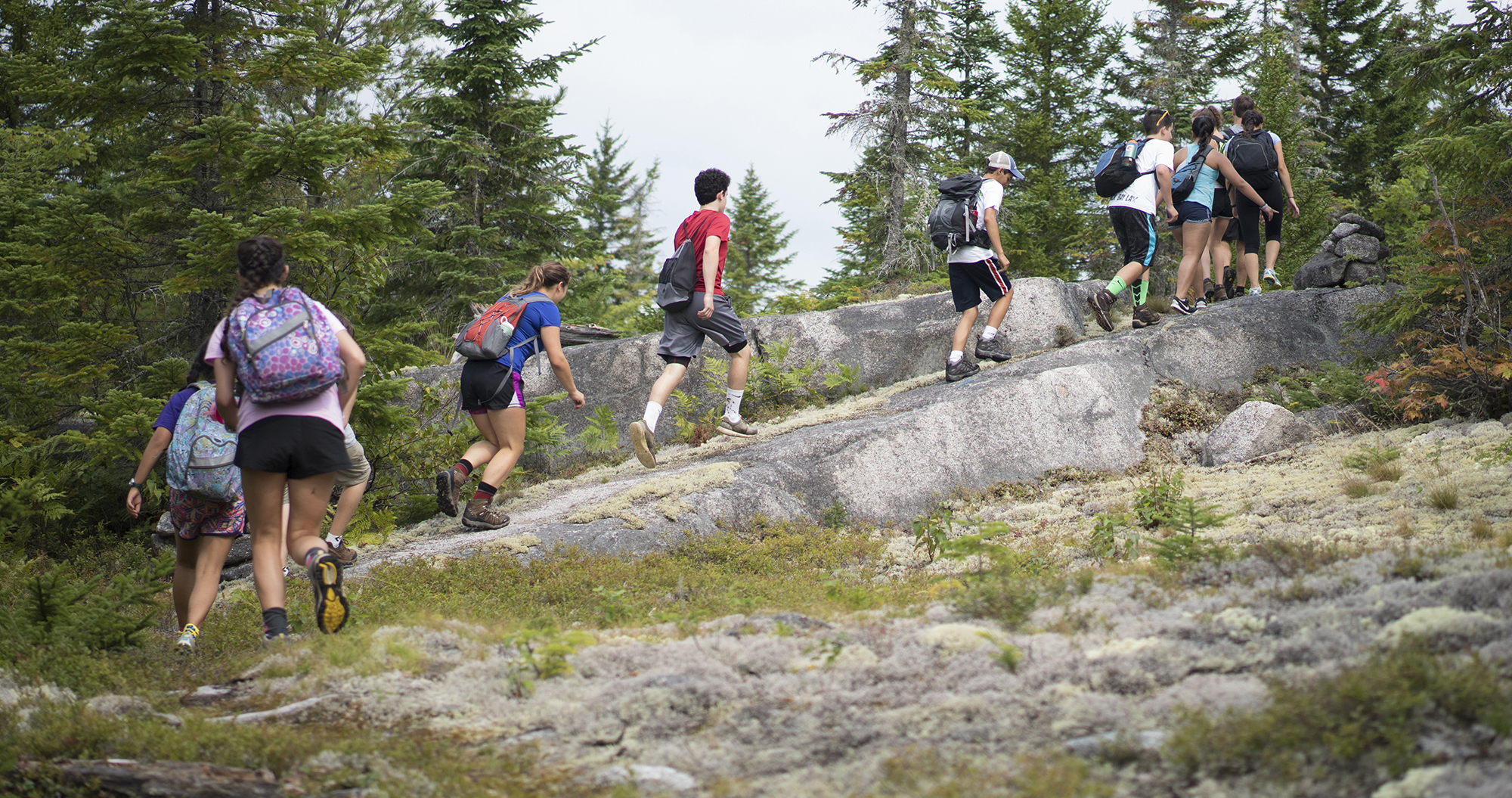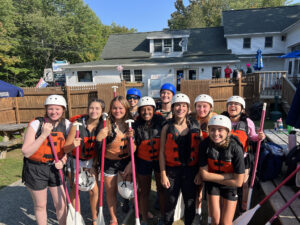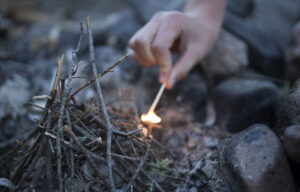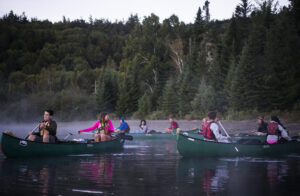
The Transformative Power of Waynflete’s Outdoor Experience Program
For almost half a century, Waynflete’s Outdoor Experience (OE) program has launched the academic year by immersing Upper School students in the natural world. As students venture into Maine’s wilderness—hiking the Presidentials, cycling in Acadia, paddling the Allagash—they begin building the connections that define our close-knit community.
Learning in the Natural Classroom
 The natural world serves as an extraordinary classroom, enabling our students to form profound connections to the natural world while simultaneously deepening their relationships with peers and faculty. During OE, students experience settings ranging from mountain trails to coastal islands, away from digital distractions and daily routines. Each grade embarks on age-appropriate adventures during the first week of school. Ninth graders travel to the North Maine Woods for an introductory week of camping, canoeing, and hiking. Tenth graders might find themselves hiking through the White Mountains on day hikes or on an overnight hut-traverse Seniors during their final year at Waynflete, navigate Maine’s rivers in whitewater rafts.
The natural world serves as an extraordinary classroom, enabling our students to form profound connections to the natural world while simultaneously deepening their relationships with peers and faculty. During OE, students experience settings ranging from mountain trails to coastal islands, away from digital distractions and daily routines. Each grade embarks on age-appropriate adventures during the first week of school. Ninth graders travel to the North Maine Woods for an introductory week of camping, canoeing, and hiking. Tenth graders might find themselves hiking through the White Mountains on day hikes or on an overnight hut-traverse Seniors during their final year at Waynflete, navigate Maine’s rivers in whitewater rafts.
Tenth and eleventh graders can opt for community service experiences, working with organizations like Habitat for Humanity or food rescue programs. What might seem like an unusual way to begin the school year (spending a week in the wilderness instead of sitting in classrooms) quickly reveals itself as an essential foundation for the entire academic experience.
The philosophy behind OE recognizes that learning happens when students step outside their comfort zones. In outdoor settings, natural consequences for group work become immediately apparent. Effective collaboration means everyone arrives at the destination, stays safe and dry, and gets fed—outcomes that are challenging to replicate in traditional classroom settings. When removed from familiar environments and routines, students discover new dimensions of themselves and others.
For many students, especially those who have never gone camping or spent extended time in the outdoors, OE can initially seem daunting. Yet this shared challenge becomes a foundation for community building. Students quickly discover that supporting each other and simply having fun creates bonds that transcend typical social groups. Laughter around a campfire, collaborative meal preparation, and celebrating small victories together transform what might be intimidating into an adventure that students eagerly anticipate each year.
A student who might be quiet in class may emerge as a natural leader on the trail. Someone who struggles academically might excel at problem-solving when faced with a flooded river crossing or an unexpected rainstorm. As Upper School teacher David Vaughan notes, “We’re putting ourselves out into the wild because we have so much nature-deficit disorder and digital busyness. So as we take ourselves into nature, the curriculum emerges from experiences.”
Perhaps one of the most powerful aspects of OE is the absence of technology. Students leave their devices behind, creating space for authentic human connection without digital intermediaries. Removing these distractions enables students to engage in deeper conversations, forge stronger bonds, and be truly present. As Upper School Librarian Emily Graham explains, “If we have access to technology, we often default to keeping busy with our devices rather than experiencing the feeling of being unsure of what to do or say. But in OE, we have to look up, look around, and look to others.” The internal rhythm slows in nature, allowing for different kinds of attention and awareness to develop.
The program creates unique opportunities for students and faculty to engage with each other beyond their typical classroom roles. These shared experiences lay the groundwork for relationships built on mutual respect and understanding. These authentic connections continue to strengthen throughout the school year.
Embracing Challenge and Growth
The impact of OE extends far beyond the wilderness experience itself. Many alumni identify these high school trips as transformative moments in their education, with some even featuring these experiences in college application essays. As one former student reflected, “I came away from that trip with an understanding of the truly transformative power of nature—both for myself as an individual and for groups as a whole.” Years later, alumni recall not just the beautiful vistas or physical accomplishments, but the moments of connection, vulnerability, and growth.
 What began almost 50 years ago as a novel approach to building community has evolved into a cornerstone of Waynflete’s philosophy. The program continues to adapt while maintaining its essential purpose: using Maine’s natural beauty as a setting for students to connect with themselves, each other, and the wider world. In a time when young people face unprecedented digital stimulation and social pressure, OE offers a precious opportunity to slow down, look up, and engage with each other.
What began almost 50 years ago as a novel approach to building community has evolved into a cornerstone of Waynflete’s philosophy. The program continues to adapt while maintaining its essential purpose: using Maine’s natural beauty as a setting for students to connect with themselves, each other, and the wider world. In a time when young people face unprecedented digital stimulation and social pressure, OE offers a precious opportunity to slow down, look up, and engage with each other.


